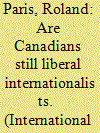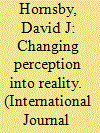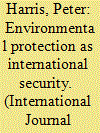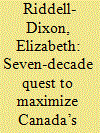|
|
|
Sort Order |
|
|
|
Items / Page
|
|
|
|
|
|
|
| Srl | Item |
| 1 |
ID:
135096


|
|
|
|
|
| Summary/Abstract |
Since coming into office in 2006, the government of Prime Minister Stephen Harper has rejected many of the symbols and practices of the liberal internationalist approach to foreign affairs that Canadian governments of all political stripes broadly embraced during the preceding six decades. As part of this change, the Harper government has also promoted a new narrative about Canada’s history and foreign policy, which encourages Canadians to change how they think about their country and its role in the world. By examining recent opinion surveys, this article asks whether Canadian public attitudes on foreign policy have shifted away from liberal internationalism and toward the Harper government's narrative since 2006.
|
|
|
|
|
|
|
|
|
|
|
|
|
|
|
|
| 2 |
ID:
135207


|
|
|
| 3 |
ID:
135208


|
|
|
|
|
| Summary/Abstract |
Canadians tend to perceive Canada’s historic engagement and influence in Africa in ways very much disconnected from reality. Canada’s self-image as a humane internationalist country deeply engaged with Africa relies on an idealized version of history. Nevertheless, there have been times when the reality of Canadian foreign policy engagement with Africa has been much closer to that ideal than it is now. This paper seeks to contribute to the debate on Canada–Africa relations by building greater understanding of Canada’s position in Africa. It tackles the question of Canada’s engagement with Africa by analyzing three broad aspects of a possible relationship between a developed country and developing region: the economic, developmental, and trans-societal. Analysis of these three areas of interaction provides insight into what could be done to renew or reinvigorate Canada’s engagement with Africa.
|
|
|
|
|
|
|
|
|
|
|
|
|
|
|
|
| 4 |
ID:
135100


|
|
|
|
|
| Summary/Abstract |
Canada’s non-acquisition of nuclear weapons in the immediate postwar period represents an important puzzle. Acquisition of an independent nuclear arsenal presented Canada with an unprecedented opportunity to ameliorate its objective insecurity vis-à-vis US power. Many theories suggest that when combined with Canada’s postwar capabilities, this insecurity ought to have pushed Canada toward acquisition. I argue that Canada’s non-acquisition of nuclear weapons can only be accounted for by an explanation that recognizes the importance of trust. To do so, I develop a conceptual framework for understanding trust in international politics. Drawing on research from psychology, economics, and even neurology, I develop a model that shows how narratives like liberalism can render trusting behaviour reasonable for agents, and how five mechanisms can generate the conditions required for trust to obtain. By applying this model to the Canada–US relationship I provide an explanation for Canada’s non-acquisition that is superior to existing accounts.
|
|
|
|
|
|
|
|
|
|
|
|
|
|
|
|
| 5 |
ID:
135210


|
|
|
|
|
| Summary/Abstract |
Island bases are integral to US grand strategy in the Asia–Pacific. In this article, I discuss the increasingly common practice of using environmental protection initiatives to secure the Pentagon’s hold on these prized assets. I argue that nature reserves on or around militarized sites on Guam, the Central Pacific islands, and Diego Garcia serve to buttress US political control over the territory concerned. In short, nature reserves in the Pacific and Indian oceans give vital political cover to the island fortresses that they envelop by adding a public relations-friendly rationale for the US military’s occupation of colonized territories as well as an additional layer of politico-legal control.
|
|
|
|
|
|
|
|
|
|
|
|
|
|
|
|
| 6 |
ID:
135209


|
|
|
|
|
| Summary/Abstract |
In discussions of NATO’s failure in Afghanistan, there is an increasing recognition of the damaging influence of competition between India and Pakistan. Yet, while reference to “rivalry” abounds, few authors connect Indian and Pakistani behaviour to the established literature on international rivalry. This paper corrects this explanatory gap by applying findings from the subfield of rivalry research. States engaged in rivalry behave differently; each issue of contention is fused into the broader rivalry relationship. For India, influence in Afghanistan is a component of its regional strategy, designed to maintain dominance over Pakistan in South Asia. For Pakistan, influence in Afghanistan is sought primarily for the opportunity to confront, damage, and frustrate Indian aims. The result is continued violence and instability. For policymakers, an appropriate appreciation of the strategic and political realities in a given region is a prerequisite for future international interventions in order to avoid such complications.
|
|
|
|
|
|
|
|
|
|
|
|
|
|
|
|
| 7 |
ID:
135221


|
|
|
|
|
| Summary/Abstract |
This essay looks back on three classic texts depicting Canadian foreign policy during the Vietnam era in pursuit of lessons for policymakers in Ottawa today. It concludes that Canadians should not be so self-critical of their country’s inability to exercise influence on complex and difficult global problems. While Canada continues to be able to make a helpful contribution to world affairs, Canada’s international engagements should focus less on the often unrealistic desire to enhance the country’s image and standing abroad and at home and more on immediate tactical and operational impacts.
|
|
|
|
|
|
|
|
|
|
|
|
|
|
|
|
| 8 |
ID:
135211


|
|
|
|
|
| Summary/Abstract |
Cyberspace is a new and evolving realm of human interaction with specific security and defence concerns. Threats to commercial and government interests are being identified and many nations have accepted cyberspace as a domain of military of operations. While governments are investing in the development of military cyber capabilities, there are few examples of military cyber operations from which military doctrine can be developed. In order to bridge the gap between speculation and experience, the principles related to land, sea, and air forces can be used to provide a helpful reference for the cyber domain. The adoption of cyberspace as a domain has more to do with marketing than doctrinal consistency with physical domains. Until some future military cyber operations are categorized as armed attacks, there is insufficient cause to categorize cyberspace as a distinct domain.
|
|
|
|
|
|
|
|
|
|
|
|
|
|
|
|
| 9 |
ID:
135220


|
|
|
|
|
| Summary/Abstract |
For Canada, establishing sovereignty over its continental shelf resources has been a law of the sea priority since the Second World War. Large quantities of oil, gas, and minerals are contained in the seabed; hence, there is a strong economic imperative to establish coastal state jurisdiction. Historically, instead of taking unilateral actions, as many coastal states have, Canada has preferred multilateral channels. At the First and Second Conferences on the Law of the Sea, the Seabed Committee, and the Third Conference on the Law of the Sea, which produced the Convention on the Law of the Sea, Canada was a strong, effective advocate of coastal state rights. The convention’s provisions are highly advantageous to coastal states. Canada has incorporated these rights into its legislation, ratified the convention, spent over a decade mapping the seabed, and, in December 2013, filed a submission with the Commission on the Limits of the Continental Shelf.
|
|
|
|
|
|
|
|
|
|
|
|
|
|
|
|
| 10 |
ID:
135218


|
|
|
|
|
| Summary/Abstract |
There is no question that the number of United States Special Operations Forces (SOF) is growing. This paper argues that focusing on the increase in size obscures what should be the real debate: what kind of SOF should the US employ in the twenty-first century? I conclude with two ideas: that SOF’s best capability is at the tactical level, and that the largest benefit they can provide a democracy is in the conduct of special warfare, and not the more popular surgical strike operations. It would be wise, therefore, for democracies to resist the natural inclination to grow SOF simply because they perceive a growth in asymmetric threats. SOF, conducting special warfare, can offer democracies both a “special” capability and also more subtle, longer-term influence than is normally associated with conventional armed forces.
|
|
|
|
|
|
|
|
|
|
|
|
|
|
|
|
|
|
|
|
|